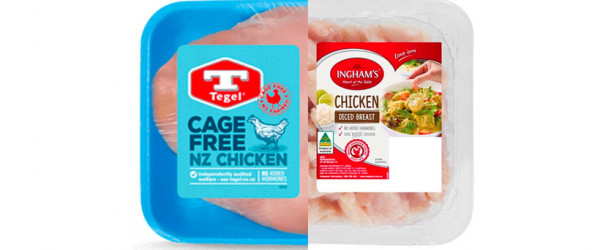
Are you being fooled by the poultry industry?
October 2nd, 2018Chicken farmers have a financial incentive to create an inherently cruel industry. The more chickens they can pack in sheds and the faster they can get them to slaughter, the more money they stand to make.
But to keep things as they are, operators must keep the public in the dark. If people knew the true suffering of the approximately 120 million chickens bred for meat each year in New Zealand, many simply wouldn’t buy into it. To get around this, the industry intentionally misleads people, through deceptive and confusing labelling.
‘Cage-free’
The term ‘cage-free’ very clearly suggests an ethical advantage over caged chickens. The reality, however, is that no chickens are bred for meat in cages in New Zealand. ‘Cage-free’ represents the rock bottom of welfare standards.
In ‘cage-free’ systems, around 40,000 birds are confined in each shed. They are so densely crammed that many die from problems associated with overcrowding and unhygienic conditions, while others from the explosive growth they are selectively bred to have.
SAFE’s Head of Campaigns, Marianne Macdonald, says people are being conned into thinking they are making an ‘ethical’ choice when in reality, they are funding cruelty. Tegel and Ingham’s, two of New Zealand’s biggest chicken brands, both market their products as ‘cage-free’.
“People would be disgusted if they knew how the chicken they buy was raised – so the industry makes sure people don’t know. Every day in New Zealand around 10,000 birds die of health-related causes in these sheds.”
‘Free-range’
A ‘free-range’ label again implies an ethical advantage and less suffering for the chicken. However, ‘free-range’ systems are little better than conventional ones because the sheds are only required to have small outdoor access points, which together with the huge number of birds confined, makes it difficult for individual chickens to get outside.
“Just like conventionally raised chickens, most of these free-range birds spend their lives in a shed in their own waste, which accumulates over their lifetime. The first time many of these overgrown baby birds experience the outdoors is when they are shoved into crates, open to the elements on the back of a truck, and taken to be killed at a slaughterhouse.”
‘Hormone-free’
The chicken industry knows people don’t like hormones being added to their food. That’s why the term ‘hormone-free’ makes regular appearances on packaging. But while New Zealand chickens aren’t fed hormones as such – they are pumped with antibiotics.
A 2013 report by the Ministry for Primary Industries found 100 per cent of conventional (non-free-range) farms used antibiotics in the feed, to dose entire flocks. They do so to prevent outbreaks of disease, caused by severe overcrowding and the unhygienic conditions – chickens living in a lifetime of their own waste.
There is worldwide concern that this widespread use of antibiotics in poultry farming puts human health at risk, through increased resistance to bacteria over time.
So when the label says ‘hormone-free’, don’t be fooled into thinking nothing is added.
Take action
Help us make changes to improve chicken welfare.
On a personal level, the best thing you can do is keep chicken off your plate.
